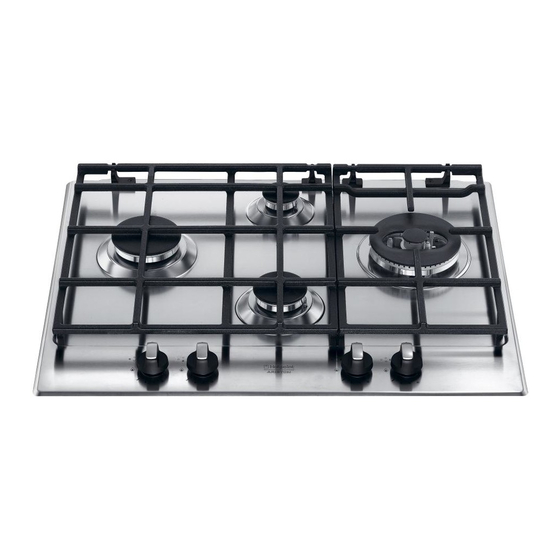Ariston PK 640 R GH AUS Panduan Petunjuk Pengoperasian - Halaman 10
Jelajahi secara online atau unduh pdf Panduan Petunjuk Pengoperasian untuk Kompor Ariston PK 640 R GH AUS. Ariston PK 640 R GH AUS 32 halaman.
Juga untuk Ariston PK 640 R GH AUS: Panduan Petunjuk Pengoperasian (44 halaman)

AUS
Replacing the Triple ring burner nozzles
1. Remove the pan supports and lift the burners out of their
housing. The burner consists of two separate parts (see
pictures).
2. Unscrew the nozzles using a 7 mm socket spanner.
Replace the nozzles with models that are configured
for use with the new type of gas (see Table 1). The two
nozzles have the same hole diameter.
3. Replace all the components by completing the above
operations in reverse order.
• Adjusting the burners' primary air :
Does not require adjusting.
• Setting the burners to minimum:
1. Turn the tap to the low flame position;
2. Remove the knob and adjust the adjustment screw, which
is positioned in or next to the tap pin, until the flame is
small but steady.
! In the event of single-control DRDA (DCDR) burners,
adjustment can be performed by intervening on the 2 screws
located near the tap pin (see picture).
3. Having adjusted the flame to the required low setting,
while the burner is alight, quickly change the position
of the knob from minimum to maximum and vice versa
several times, checking that the flame does not go out.
4. Some appliances have a safety device (thermocouple)
fitted. If the device fails to work when the burners are set
to the low flame setting, increase this low flame setting
using the adjusting screw.
5. Once the adjustment has been made, replace the
seals on the by-passes using sealing wax or a similar
substance.
10
! If the appliance is connected to liquid gas, the regulation
screw must be fastened as tightly as possible.
! Once this procedure is finished, replace the old rating
sticker with one indicating the new type of gas used. Stickers
are available from any of our Service Centres.
! Should the gas pressure used be different (or vary slightly)
from the recommended pressure, a suitable pressure
regulator must be fitted to the inlet pipe (in order to comply
with current national regulations).
Post Installation Checks
Perform post installation checks and ensure proper and
safe operation before leaving. Test all burners individually
and in combination.
Leak Check
• Ensure all gas control knobs are in the Off position.
• Ensure the gas supply is switched on.
• Spray a solution of soapy water onto all gas joints
If bubbles appear anywhere, turn the gas supply off, check
all connections and retest. If satisfactory operation cannot
be achieved, contact place of purchase or their appointed
agent for service.
Flame check
Turn each burner on, and ensure that the flame is blue with
minimal yellow tipping. If there is significant yellow tipping,
flame lift off or excessive noise, check pressure and adjust
at the regulator if necessary.
If satisfactory operation cannot be achieved, contact place
of purchase or their appointed agent for service.
Igniter operation
Check that the igniter for each burner successfully ignites
the gas.
If an igniter fails to work, first remove the plug from the
electrical power outlet, and then check that all the electrical
Total DRDA
connections are in place.
(DCDR) burner
adjustment
If satisfactory operation cannot be achieved, contact place
of purchase or their appointed agent for service.
Low flame setting
Check the low flame setting for each hob burner to ensure
Inner DRDA (DCDR)
burner adjustment
that the minimum flame will not be extinguished by air
draughts.
• Light the burner.
• Turn the control until it engages in the minimum position.
• Ensure the flame is stable and will not be extinguished
To adjust the minimum flame:
Follow the procedure described in the gas conversion
instruction.
DO NOT MODIFY THIS APPLIANCE IN ANY WAY, OTHER
THAN AS DESCRIBED IN THESE INSTRUCTIONS.
as well as the full length of any flexible hoses.
UNDER NO CIRCUMSTANCES USE A NAKED FLAME
IN CHECKING FOR LEAKS.
by air draughts.
